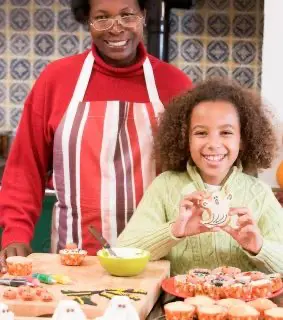Family Therapy
Advice for building happy and healty families.
By Patricia Adamo, M.A.,
Helping Adult-Children to Grow Up and be Emotionally Healthy and Independent

Our children don't grow up in a vacuum, and, as such, we as parents need to recognize that many of our behaviors help to form our child's personality and the perceptions they may have of themselves and their place in the world.
For adult children whom do not become sufficiently independent to move out and away from the parent's influence or care, upon examination, we often find that there is a "dependency" pattern which has developed within the family relationship. This is usually fostered by parents in an unwitting attempt to be "good" or "perfect" parents.
Parents of adult children tend to be less authoritarian, less authoritative, and more permissive. Their children typically have lax house "rules", lots of T.V., or game time, too much help with homework, no real responsibilities. As teens, they often have no chores around the house, may not keep up with grades, and usually spend a great deal of time out with friends socializing. Because these parents see themselves as loving, caring, involved and concerned, they would be shocked to discover that their behaviors are contributing to their children's dependency.
Something as simple as continually tying your child's shoes, because you're in a hurry, rather than patiently allowing them to struggle through the task, is only one small example of an error you may unknowingly make. Children need to develop a sense of self-efficacy, the knowledge that they are capable of completing a task. When we continually do things for our child that they can, and should, do for themselves, we not only rob them of a sense of accomplishment, but we also send them a "covert" message: "I don't trust you to do a good job for yourself."
How can we expect our children to become independent if we have never allowed them to do for themselves?
Having specific house rules agreed upon by all family members is a start. Children can understand from an early age that completing homework or doing small chores has rewards, not only in the form of treats, but also in the sense of accomplishment we get from a job well done.
Too many parents reward a child to quiet them or to get their cooperation. To lavish money, treats, and gifts on a child for no apparent reason only encourages a sense of entitlement. (ie: "I'm entitled to live here with you, let you do my laundry, feed me, and spend my money as I wish because you love me, and I didn't ask you to be born!" ). An allowance should be earned, the privilege of going to the mall with friends should be earned. Whatever the child values can be used as "currency" to reward the child for a task well done. I don't believe in rewarding children for being adorable, and neither will their future employers in the real world.
Everything we do in regard to our family and children prepares them for their lives without us. To raise a child to think for themselves, to have their own opinions, to care for their belongings, to be considerate of others, to do those tasks necessary for their emotional and intellectual growth is the most important job a parent has.
How can we expect our adult-children to grow up and be emotionally healthy, independent, successful human beings if we don't provide them with the tools necessary to do so?
About Pat Adamo
Pat Admao, received her master degree from the University of South Florida. She is th co-author of Pattern Typicality and Practice in Perceptual Identification, Body Image in Anorexia Nervosa and Bulimia Nervosa, and "Incidental Learning in Semantic and Non-Semantic Tasks. Her areas of practice included psychotherapy for children, adolescents, and adults. Areas of specialties included family therapy, children's behavioral problems, A.D.H.D. and co-morbid disorders of aggression, eating disorders and anti-social behaviors. She has also been active with family court and prepared and testified, in coordination with Guardian ad Litem, in cases involving childhood sexual abuse or neglect.Ms Adamo has provided marriage and family counseling for more than 15 years. She has taught classes and lectured on parenting skills and addictions.
Editor's Note:
The pandemic caused many young people who may have
lived independently to move back to their parents’ home.
If you in this situation here are a few pointers to make that
transition easier.
Family and
Friends
You may have enjoyed inviting friends round for
dinner or for a party in your own space but you will no longer have that
freedom.
Moving back in with family means that you need to
take their needs into consideration; you are now living in their home
and that means their rules so inviting your university friends over for
dinner and drinks is not a great idea.
Your parents have
got used to doing their own thing and whilst they love you dearly they
may not take too kindly to stubborn red wine stains on their carpet!
Their patience may well be tested if the neighbours complain about the
noise from you gathering because you thoughtlessly left the windows
open.
When you are in your parents’ home you may be able to
have people round but you should ask your parents beforehand.
If your parents say no, or place a limit on numbers or how long visitors can
stay; respect their wishes. You’re not fourteen anymore so don’t act
like it.
Doing Your Bit
When adult children
need to move back in with mum and dad it is all too easy to revert to
the habits of the past and expect everything to be done for you. You
need to remember that your parents are doing you a favor; they may have
reached a point in their lives in which they enjoy having the place to
themselves.
Stop any resentment before it starts by giving your
parents some space from time to time and doing your bit around the
house. You could offer to cook a couple of times a week and clean the
windows once a
month.
Parents can be judgmental when you are living back at home so be
prepared for some criticism. Keep your own room clean and tidy; you’re
not a teenager any more and your parents deserve some consideration –
act like the adult you are and you will receive adult
treatment.
Finances
You may not receive
much in unemployment pay, but you should be open with your parents about
what you do have so that you can come to an agreement about what you
should pay towards your keep – if possible sort this out with your
parents before moving back home.
If you are fortunate enough to find a job, offer to make a more realistic contribution to the
household budget, even if you are saving most of it towards moving out
to your own place again.
Don’t Get too Settled
You need to see moving back in with your parents as a
temporary measure. Make sure that everyone understands that the
situation is temporary and you intend to do everything you can to become
self sufficient again. You need to have a detailed plan for the future
and a realistic goal for when you expect to be back in a home of your
own.
About Us-
Contact Us -
Privacy Policy©2023 TheParentVine.com a brand owned by GADL Enterprises, LLC. All rights reserved.
TheParentVine.com earns commissions on products sold.



